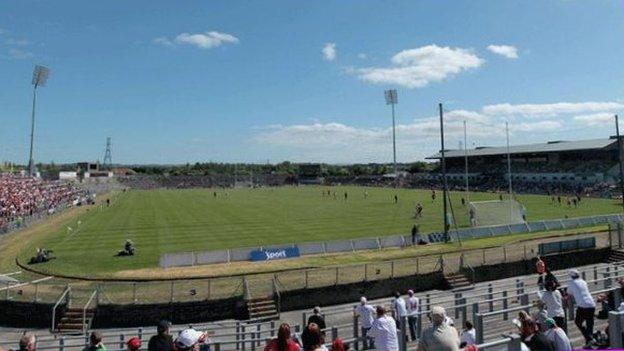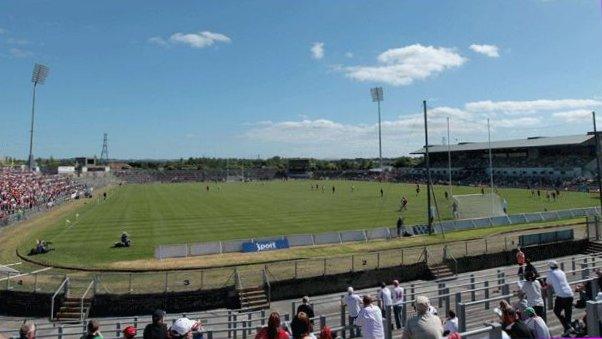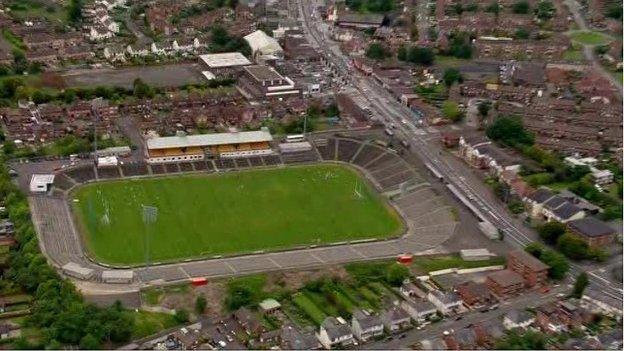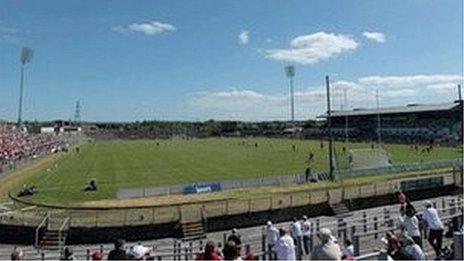Casement Park: Planning approval 'injustice', court told
- Published

A new stadium is expected to be completed by September 2015
Approving a new stadium in Belfast is an injustice which would be unacceptable anywhere else in Northern Ireland, the High Court has heard.
Casement Park is to be redeveloped to become the GAA's premier venue in Northern Ireland.
Environment Minister Mark H Durkan first gave the green light for rebuilding the stadium last December.
A legal challenge to the 38,000-seater stadium got under way on Wednesday.
Lawyers for a residents' group claimed surrounding homes will be dwarfed by the scale of the rebuilding scheme.
A judge was also told that police concerns about the impact on traffic were not put to the Stormont minister who granted planning permission.
The new stadium, to be built on the existing site, is to include fully modern facilities and corporate resources.
Most of the funding is coming from the Northern Ireland Executive through the Department of Culture, Arts and Leisure.
'Block light'
But the Mooreland and Owenvarragh Residents Association (MORA) claim a 38,000-seater ground will be too big for the neighbourhood.
They argue that a stadium of that magnitude will block out light, reduce the quality of life for those living close by and compound traffic congestion.
It is further alleged that planning chiefs failed to properly assess the new Casement Park as a mixed-use facility also capable of holding concerts and other public events.
A barrister for MORA stressed that his clients were not opposed to any redevelopment.
Many of them were described as "grassroots GAA supporters" who would have no problem with a more modest 20,000 to 25,000-seater stadium scheme.
The barrister said: "The residents feel this planning permission is simply an injustice and they are being expected to put up with an impact on their lives and their properties which would not be accepted anywhere else in Northern Ireland."
Mr Justice Horner was shown current photos of the ground and impressions of how it will look if the plans go ahead.
The proposed new ground would dominate the surrounding landscape and skyline, he was told.
The judge confirmed, however, that he will visit and inspect the site for himself after hearing all arguments.
Setting out the main grounds of challenge, the barrister claimed there were failures to apply to keep planning policy and fully examine the impact on traffic.
"What happened in this case falls very far short of what the department's own guidance says should happen for developments of this type," he said.
The barrister said police expressed "huge concerns" about potential traffic issues.
"The minister was told nothing whatsoever about the PSNI position when he was provided with the materials to allow him to make his decision," he told the court.
The barrister claimed there had been a "rush" to grant planning permission within six months of the application being submitted.
"That is the task the planning service set itself and that is the goal which the minister delivered," he said.
"That was done, we submit, at the expense of detailed consideration of a number of issues."
The case, which is listed for a four-day hearing, continues.
- Published1 April 2014

- Published18 March 2014

- Published13 March 2014

- Published6 February 2014

- Published25 January 2014

- Published19 November 2013
